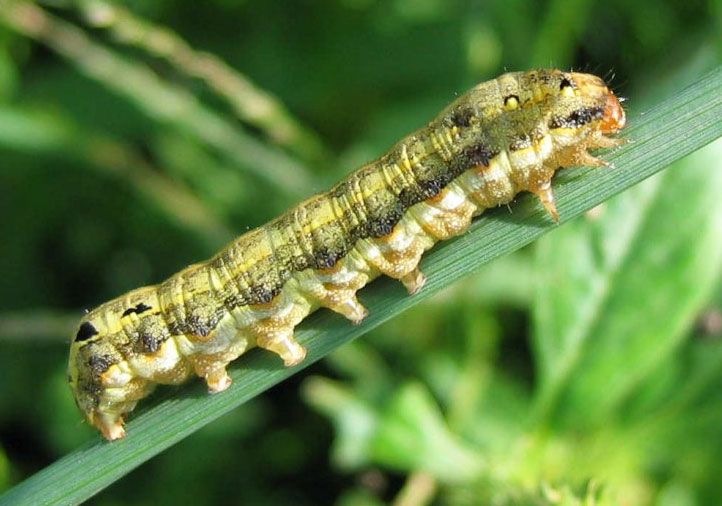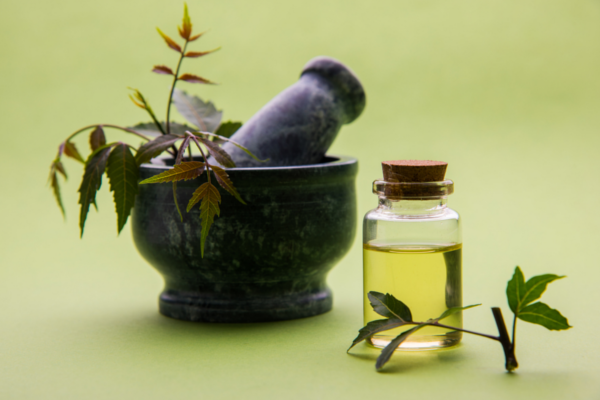Neem is an evergreen tree native to Indian sub-continent and is also found in other southeast countries. It is remarkably tolerant to both heat and drought and can grow up to twenty feet in three years. It is a typical tropical/subtropical tree and exists at annual mean temperatures between 21-32 °C. It can tolerate high to very high temperatures. It does not tolerate temperature below 4 °C. It has pesticide, germicide, and medicinal properties. It is resistant to termites and is often used in reforestation efforts
Neem as an organic pesticide in agriculture
Researchers all around the world are focused on the importance of neem in agriculture. The tree has hundreds of active biochemical compounds that have no toxic reactions and thereby helpful in plant protection.
Neem contains several thousands of chemicals, of which terpenoids are unique to Neem. More than a hundred terpenoids are known, but the most active and well-studied compound is Azadirachtin. Several different kinds of azadirachtin (A-K) have been isolated, the most abundant of which is Azadirachtin-A. Traditional neem oil preparation contains a mixture of all of those biochemical components.
Neem is a powerful insect growth regulator (Insect Growth Regulators – IGR), and also control nematodes and fungi. It has a non-violent approach by intervening at several stages of the insect’s life and thereby incapacitating in several ways. Natural pesticides prepared from neem reduce the growth of insects in crops. Scientific studies have confirmed that neem can effectively get rid of over 200 pest species that affect plants. A number of research articles prove that neem is effective against thrips, whiteflies, aphids, leaf miners, bugs and a large number of insect pests. Neem doesn’t have side effects for people, mammals, useful insects (bees, butterflies…) and earthworms.

Advantages of neem as a natural pesticide:
• It is eco-friendly. It does not kill the non-target hosts like natural predators, honeybees, earthworms.
• It is nontoxic to humans, birds and does not pollute the aquatic sources.
• It can be combined with other ecological substances for a better effect.
• Does not kill pests directly, but it influences their life cycle. So, pests can’t develop resistance.
• Its
Application of neem in Agriculture
• Neem Insecticide
• Neem Pesticide
• Neem Pest Fumigant
• Neem Fertilizer
• Neem Manure
• Neem Compost
• Neem Urea Coating Agent
• Neem Soil Conditioner
• Neem
Application of neem in health care
In Ayurvedic medicine, neem is a popular medicinal herb and its applications dates as back as 5000 years. Neem extracts

Skin: Neem is effective against acne and contributes to beautiful, glowing skin. Bacterial infections on the skin are nullified by the anti-inflammatory properties of neem. Mild skin problems, infections, burns can also be healed by applying pure neem oil directly on the skin. Neem oil applications have been scientifically proved to control psoriasis, eczema, skin allergies etc.
Hair: The high fatty acid in neem is extremely good for scalp health. It maintains the pH balance, making your hair healthy. Massaging your scalp with neem oil can increase the blood circulation in the scalp and its regenerative properties help in enhancing the hair growth rate. Neem oil equally capable to fight against dandruff.
Blood Purification: Neem is rich in natural antioxidants that enables it to be a very effective blood purifier. It helps in the functioning of organs that eliminates the toxins like liver and kidney. It dilates blood vessels in a healthy manner and supports circulation by blood. Tender neem leaves while taken regularly controls high blood sugar and regulating blood pressure. Intake of neem tea twice a day will lower blood sugar.
Dental care: Neem bark especially supports dental health; in fact, its most common use is as a sort of natural, chewable toothbrush. Most of the Ayurvedic toothpaste contains neem bark. It helps heal sore gums and helps prevent tooth decay by strengthening the gums and teeth.
Neem as a
Neem malaria control: Neem clearly has great potential in preventing malaria, a parasite that kills more than a million people per year. The flavonoid quercetin is one of the major constituents of Neem. It is also is a strong inhibitor of the growth of the intraerythrocytic malaria parasite. Neem leaf tea is proposed systematically in Africa to malarial patients who have less access

